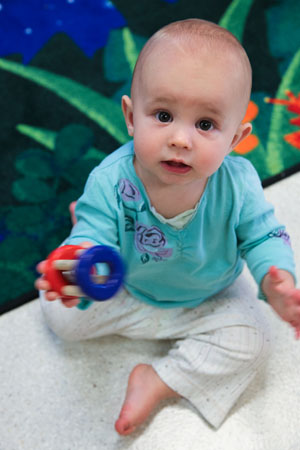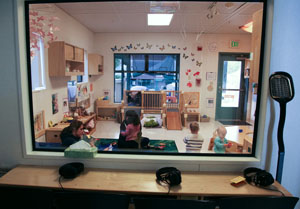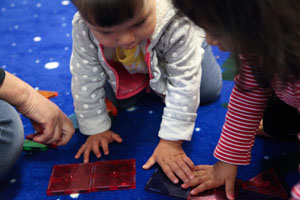Campus News
New child-study room a bridge to research and teaching
The Early Childhood Education Center was able to remodel its observation room as part of a $165,000 grant from the Claire Giannini Fund, allowing advanced developmental psychology students a place to practice scientific observation.



Standing in the colorful toddler room of UC Santa Cruz’s Early Childhood Education Center, a small girl discovers a view of her elbow in a pink hand mirror. Her brow furrows as she studies the previously unexamined joint. She turns the mirror toward her toes, then her knees — and breaks into a grin.
It’s one of those wonderful moments in childhood development that might have gone unnoticed — except for a new child-study observation room installed last year at UCSC’s busy Early Childhood Education Center as part of a $165,000 grant from the Claire Giannini Fund.
The room, remodeled at a cost of $30,000, not only allows UCSC advanced developmental psychology students a place to readily practice scientific observation but also lets Early Childhood Education Center staff hone their skills, permits parents to observe their children, and facilitates faculty research.
“It’s a bridge to research and teaching,” says Early Education Services Director Sohyla Fathi.
For years, UCSC’s developmental psychology students have had to drive halfway across the county to Cabrillo College to experience the rigors of scientific observation — “a fundamental skill of scientific practice,” according to Emerita Professor of Psychology Catherine Cooper.
While the large number of beginning students still can’t be accommodated at the new child-study center, advanced students can simply walk to Family Student Housing, where the center is located, in order to hone their research abilities.
Sitting in the small room, which is equipped with a one-way mirror, three sets of headphones and an unassuming writing table, advanced students in classes taught by professors Nameera Ahktar and Su-hua Wang spend 30 minutes at a time carefully observing the behavior of children from 11-24 months of age. They study physical and language development, they watch how children play, how teachers guide their charges. Students are then called upon to analyze what they have seen — the way any scientific researcher would.
“It sharpens the eye and the ear,” says Cooper of the skills students learn at the center. “It attunes them to patterning in human behavior.”
It’s a proficiency, she says, students can take into the real world.
For Fathi, who directs the program, the observation room provides a way for teachers to sharpen their skills and improve curriculum design. The observation room also opens opportunities for other potential funding because the program now has a research lab attached to it. Setting up the room has been at the top of her priority list since she took over the program two years ago, Fathi says, and wouldn’t have been possible without the Claire Giannini grant.
Betsy Buchalter Adler (Cowell, ’70, psychology), one of the trustees of the $29-million Claire Giannini Fund, says the opportunity to support not only UCSC’s observation room but also to increase hours so student-parents don’t have to miss late-afternoon or early-morning classes is something Claire Giannini Hoffman would have appreciated.
The daughter of Bank of America founder A.P. Giannini and a businesswoman in her own right, Giannini specified that her trust be spent on the health, wellbeing and education of children under the age of 18.
“Good early childhood education is one of the best investments you can make in a community,” says Buchalter Adler, who notes the trust does not accept unsolicited proposals.
The grant also has allowed faculty and staff to provide workshops for parents on topics like toddlers and media, and on bilingual education.
“This is a learning community,” Cooper says as she stands in the new observation room, “and we’re all learning together.”